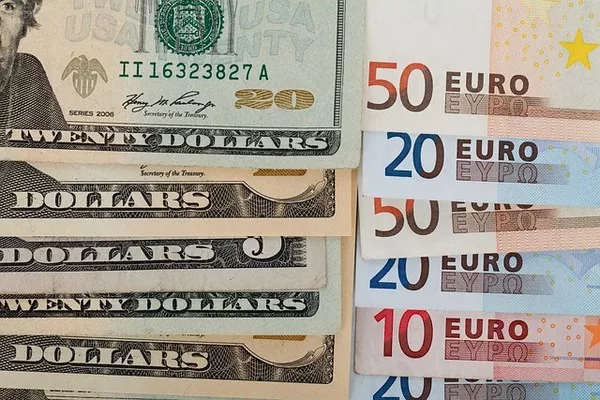In the realm of global finance, two currencies stand out: the Euro and the US Dollar. While the Euro, the currency of the Eurozone, has emerged as a significant player on the international stage, it has not been able to displace the dominance of the US Dollar. Despite efforts to promote the Euro as an alternative reserve currency, several economic realities prevent it from supplanting the Dollar’s preeminent position. This article delves into the complexities of global finance to elucidate why the Euro cannot replace the Dollar.
Historical Context
The US Dollar has been the linchpin of the international monetary system since the end of World War II. The Bretton Woods Agreement established the Dollar as the primary reserve currency, backed by gold, and pegged to other currencies. However, this system collapsed in the early 1970s, leading to the era of fiat currencies. Despite this shift, the Dollar’s dominance endured due to various factors, including the size and stability of the US economy, the liquidity of Dollar-denominated assets, and the geopolitical influence of the United States.
The Euro, introduced in 1999, aimed to challenge the Dollar’s hegemony by providing a unified currency for the European Union (EU). The Eurozone, consisting of 19 member countries, represents a formidable economic bloc with a combined GDP rivaling that of the United States. Initially, there were high expectations for the Euro to emerge as a viable alternative to the Dollar, but several factors have hindered its ascent.
Economic Realities
Size and Stability of the US Economy:
The United States boasts the world’s largest economy, characterized by robust GDP growth, technological innovation, and a dynamic business environment. The Dollar’s status as the global reserve currency is underpinned by the strength and stability of the US economy. Conversely, the Eurozone faces challenges such as structural disparities between member states, fiscal imbalances, and sluggish economic growth. While the Eurozone collectively rivals the US in economic output, internal divergences undermine the Euro’s credibility as a stable alternative to the Dollar.
Financial Markets and Liquidity:
The depth and liquidity of financial markets denominated in US Dollars are unparalleled. The Dollar dominates international trade and investment transactions, facilitating seamless global commerce. Moreover, the US Treasury market is the largest and most liquid government bond market globally, serving as a safe haven for investors during times of uncertainty. In contrast, Euro-denominated assets lack the same depth and liquidity, limiting their attractiveness to global investors. The absence of a unified Eurozone bond market further hampers the Euro’s ability to compete with the Dollar in the realm of international finance.
Reserve Currency Status:
The Dollar’s reserve currency status is reinforced by its widespread use in official reserves held by central banks worldwide. Central banks stockpile Dollar reserves to maintain exchange rate stability, facilitate international trade, and mitigate currency risks. The Euro, while included in central bank reserves, lags far behind the Dollar in terms of global reserve currency usage. Central banks exhibit a preference for Dollar-denominated assets due to their liquidity, credibility, and the absence of viable alternatives in sufficient quantities.
Geopolitical Considerations:
Geopolitical factors play a significant role in determining the dominance of a reserve currency. The United States’ status as a global superpower affords the Dollar unique advantages in international affairs. The Dollar’s dominance is bolstered by the geopolitical influence wielded by the US, including its military capabilities, diplomatic alliances, and cultural hegemony. In contrast, the Euro lacks a comparable geopolitical framework to support its ascension as a reserve currency. The absence of a unified European foreign policy and security apparatus limits the Euro’s ability to rival the Dollar’s geopolitical clout.
Challenges and Reform Efforts
Despite the formidable obstacles facing the Euro, efforts to enhance its international standing persist. European policymakers have pursued various initiatives aimed at promoting the Euro as a reserve currency and reducing its dependence on the Dollar. These include:
Strengthening Economic Integration:
Enhancing economic convergence and institutional cohesion within the Eurozone is essential to bolstering the Euro’s credibility as a reserve currency. Efforts to harmonize fiscal policies, deepen financial integration, and address structural disparities among member states are crucial steps toward achieving this objective. The establishment of a Eurozone-wide bond market, commonly referred to as eurobonds, could enhance the Euro’s liquidity and attractiveness to global investors.
Promoting Financial Market Development:
Encouraging the development of deep and liquid financial markets denominated in Euros is essential to rivaling the Dollar’s dominance. Measures to enhance the liquidity and efficiency of Euro-denominated assets, such as government bonds and corporate securities, could broaden the Euro’s appeal to international investors. Moreover, initiatives to promote the international use of the Euro in trade invoicing and settlement would further solidify its position as a global currency.
Strengthening the International Role of the Euro:
Advocating for the broader use of the Euro in international transactions and reserves requires concerted efforts by European policymakers. This entails promoting the Euro as a viable alternative to the Dollar in trade finance, investment, and official reserves. Furthermore, enhancing the Euro’s role in global payment systems and reducing reliance on Dollar-dominated clearing and settlement mechanisms would facilitate its broader adoption by market participants worldwide.
See Also Is Europe in a Recession? All You Need to Know
Conclusion
While the Euro has emerged as a significant currency in the global financial landscape, it faces formidable challenges in supplanting the Dollar’s dominance. Economic disparities within the Eurozone, the liquidity of Dollar-denominated assets, the Dollar’s reserve currency status, and geopolitical considerations all contribute to the Euro’s inability to replace the Dollar. Nonetheless, concerted efforts to strengthen the Euro’s international standing through economic integration, financial market development, and advocacy for its broader use hold the potential to gradually diminish the Dollar’s hegemony over time. As the dynamics of global finance continue to evolve, the quest for a multipolar monetary system remains an ongoing endeavor shaping the future of the international monetary order.


